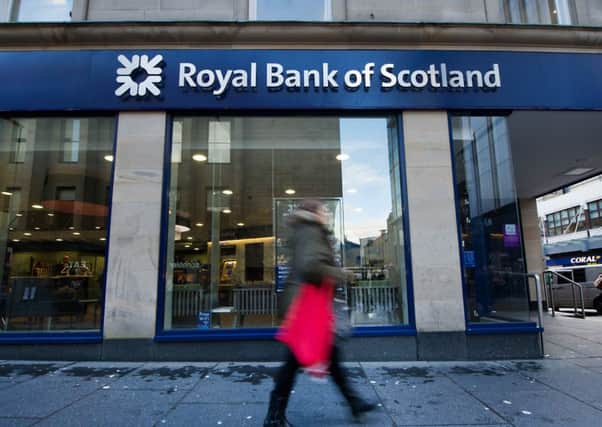RBS shares slump after eighth year of losses


The group, which is 73 per cent owned by the taxpayer, posted a deficit of £2 billion, although this is down on the £3.5bn reported a year earlier.
Investors had hoped to see the bank pay its first dividend this year since it was rescued from collapse by a £45bn government bailout in 2008.
Advertisement
Hide AdAdvertisement
Hide AdBut the bank said it faced a number of issues including uncertainty over the scale of the misconduct charges it still faces, and delayed preparations to sell its 316-branch Williams & Glyn UK retail banking business that could fetch as much as £1.5bn.
The lender said “we now consider it more likely that capital distributions” will resume later than the first quarter of 2017, leading shares to fall more than 7 per cent.
Hargreaves Lansdown senior analyst Laith Khalaf said: “Markets had expected a 2016 payment, but RBS now says this won’t happen before it gets itself clear of the worst of the conduct charges for mis-selling mortgage securities in the US – 2017 is now the earliest shareholders can expect a dividend.”
The company’s bonus pool was cut by 11 per cent to £373 million for 2015, although chief executive Ross McEwan saw his total annual pay package double to £3.8m as it included long-term incentive payouts for the first time.
For the second year in a row he did not take a £1m “role-based” incentive, which is paid on top of salaries by some banks.
The losses at RBS come after it said last month it would set aside billions to cover past mistakes as part of a raft of mammoth financial provisions.
The bank said yesterday that it has set aside £3.6bn in conduct charges. This includes £2.1bn to cover expected legal action on US residential mortgage-backed securities, as well as £600m extra for payment protection insurance (PPI) mis-selling compensation.
The bank said it amassed restructuring costs of £2.9bn last year, as it sells off its investment banking and overseas operations to become a smaller and less complex lender.
Advertisement
Hide AdAdvertisement
Hide AdIt plans to exit 25 of the 38 countries it has a presence in to focus predominantly on the UK and Ireland.
Mr McEwan said: “RBS made progress again in 2015. We ended the year a simpler, stronger bank with a business anchored squarely in the UK and Ireland, focused on retail and commercial markets.”
Yesterday’s news on delayed dividends or share buybacks at the bank wrongfooted the City.
Ian Gordon, banking guru at broker Investec, said: “Before today’s statement some were expecting a capital distribution to RBS shareholders possibly in the second half of 2016. Now that looks to be not before the first half of 2017.
“In a way the impact of the Williams & Glyn flotation, or sale, on the timing looks minimal as it is not a major part of the business.
“But the drawn-out negotiations with the US department of justice is probably more meaningful for any capital return to shareholders.”
However, Michael Hewson, chief market analyst at CMC Markets, said: “Every year we hope that the time has come for the bank to turn a corner and every year we return disappointed.
“CEO Ross McEwan must be wishing he had never taken on the task of turning the bank around when he took over the reins in August 2013.”
Advertisement
Hide AdAdvertisement
Hide AdHe added: “It turns out the decision by the UK government to pare down its stake in the bank in the middle of last year doesn’t look such a bad decision after all, amidst a chorus of criticism that it was sold off too cheaply. That 330p price seems a long way away now.
“Unless there is some clear evidence that this continued drip feeding of negative news shows signs of abating, it is going to be very difficult to see a rebound in the share price, as shown by today’s sharp falls.”
RBS was ordered to divest the 300-branch Williams & Glyn by the European Commission in return for its £45bn taxpayer bailout during the 2008 industry crash.
Chancellor George Osborne sold a 5.4 per cent stake in RBS to the City in August, raising £2.1bn, but making a £1.1bn loss on what taxpayers had paid for them.
In January of this year Mr Osborne suspended the Government’s final stake in Lloyds Banking Group due to market turmoil.
Taxpayers own just under 10 per cent of Lloyds.
Analysts do not expect any resumption in the sale of government stakes of RBS or Lloyds soon.
Earlier in the week, Lloyds Banking Group reported a 7 per cent fall in annual pre-tax profits to £1.6bn compared with £1.8bn a year earlier.
The bank increased provisions for PPI compensation in the year to £4bn.
Advertisement
Hide AdAdvertisement
Hide AdThat was after the City watchdog said it was considering a deadline on compensation claims.
Lloyds Banking Group has faced the largest amount of PPI compensation claims. The new provisions take the total the bank has set aside to pay compensation to £16bn.
The bank said it welcomed “the decision of the Financial Conduct Authority to consult on a deadline for PPI complaints and the certainty that this will bring for both customers and shareholders”.
The FCA has proposed a time bar that will allow people to claim compensation for mis-sold PPI until 2018.